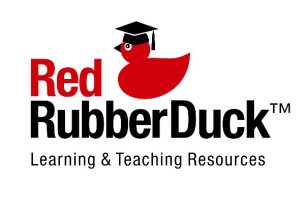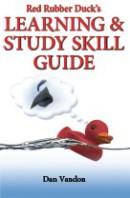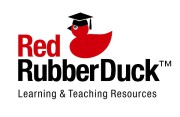
Interview with Dan Vandon
Interview with Dan Vandon, Author of Red Rubber Duck's Learning & Study Skill Guide
Interview from 2008, by Norm Goldman of Bookpleasures.com
Norm:
Good day, Dan, and thanks for participating in our interview. Please tell our readers a little bit about your professional background and how you became interested in the learning process.
Dan:
I am a lawyer, specializing in intellectual property law, and I work for a pharmaceutical company. Some years ago, I worked as a management consultant, conducting workshops and seminars on
communication skills and leadership. At that time, it was my daily business to “get the message across,” and I experienced the learning process from a very practical angle. However, my interest in
the learning process started earlier, basically when I went to law school many years ago. Back then, I was overwhelmed by the overflow of information we had to understand and recall for exams.
Managing this overflow became a matter of survival. Step by step, I developed my own study system, focusing on highly effective study and learning techniques. It has been a most fascinating
experience seeing how the use of the right study techniques can make the difference.
Norm:
How did you decide you were ready to write Red Rubber Duck’s Learning & Study Skill Guide?
Dan:
It has been a very long process. First of all, I am a very curious person, so in the 12 years since I graduated I have always been enrolled in some course, attending evening classes. I completed
another degree and I also qualified as a lawyer in another country. Figuring out how things work and discovering new fields of knowledge has become a bit of an addiction over the years. One day I
realized that I had become an expert in “how to study,” almost as an unintended side effect of my journey for new knowledge. Some years ago I decided to share my view on learning and study techniques
by writing a book.
Norm:
Why do you think this is an important book at this time? Whom do you believe will benefit from your book and why? How has the feedback been so far?
Dan:
The book provides first-hand information on how learners can be more successful in their studies. I find this very important because, in this life, access to future challenges is often limited by
judgements on past achievements with past challenges. Succeeding in studies is not a purpose in itself. It’s about opening doors and having options to choose from in life.
My personal experience is that having those options is extremely satisfying. That’s why the book is important: it can indirectly help to open doors, to develop more options. In order to get
well-paying and interesting jobs, we must be willing to keep on learning. In times of globalization, lifelong learning has become a necessity.
The book has been primarily written for college students and those who are studying towards professional qualifications. However, readers in a teaching role may use the book as the starting point for
teaching their students study and learning skills.
The methods discussed in the book probably work best with subjects that involve written material, such as texts and notes—particularly law, business, social sciences, humanities and so forth. The
book adopts a practical and down-to-earth focus, concentrating on tools and techniques that readers can instantly benefit from. The bit of theory presented here and there has been carefully chosen to
help the reader better understand how and why the tools and techniques work.
So far, the feedback has been positive. People tell me that they can’t forget the red rubber duck—that was my intention.
Norm:
What challenges or obstacles did you encounter while writing your book? How did you overcome these challenges?
Dan:
The greatest challenge was to find the right balance between providing a solid base of background information on the one hand and keeping it short, simple and practical on the other hand. If you are
an expert in a field, you always court with the great danger that you want to say too much. However, the reader only has a limited amount of time he or she can dedicate to your book.
In my field, the reader wants first-hand advice, information that is of practical use in the very moment. So, you have to focus on what is really important, the core issues. What I did to find the
right balance was ask test readers to comment on what they considered most relevant, most practical—and what was not!
Norm:
Why do you believe study habits are very rarely taught in school? As a follow up, at what stage in a child’s education should study habits be taught, and how would you go about introducing the
subject matter to students?
Dan:
This is a very interesting question. I suspect they are rarely taught because many teachers have never been formally instructed on learning techniques themselves. But, I think the situation has
changed over the last years, and the importance of “learning to learn” has become more and more apparent.
I believe you can teach kids study skills at any age, provided you adapt the techniques to their level. Take visual association techniques for example. You can easily start off by showing six- or
seven-year-old kids how to memorize a number of items by inventing and memorizing a story around those items. This can be quite a fun exercise. Of course, memorizing is only one aspect of the
learning process; but dealing with “improve your memory” exercises is a very good start.
Norm:
What, in your opinion, are the most important elements of good study habits?
Dan:
The answer to this question depends on many factors; for example, the subject you study. Unfortunately, a one-size-fits-all wonder tool does not exist. Still, with subjects that involve written
material, such as texts and notes, a study strategy should incorporate the following four elements:
First: You should learn how to structure information. Structuring means dividing a big piece of information into smaller bits, thereby making both understanding and recalling of information
easier.
Second: You should learn to always keep the big picture in mind. This means to approach information from a bird’s-eye view so you don’t loose yourself in details.
Third: You should improve your memory and train your ability to recall information on demand, because that is crucial in exams.
Last, but not least, you should learn to tailor your exam preparation to the specific requirements of the exam you are preparing to take.
Apart from that, stick to the techniques that you know work for you.
Norm:
What kind of research did you do to write Red Rubber Duck’s Learning & Study Skill Guide?
Dan:
Over the years, I have read a great number of books on learning and study techniques. When I wrote Rubber Duck’s Learning & Study Skill Guide I set down and analyzed those books again. I asked
myself: what is really important? What did work for me? Which of the many techniques on the market did impact most in my studies?
One aspect I concentrated on was finding out how we can make better use of our physical bodies and of our senses in the learning process. That’s why one important part of the book is on how we can
use visual association in order to make recall of information we have understood easier.
Apart from that, I tried to find out what techniques have been scientifically proven. For example, actively structuring information makes both understanding and recall of knowledge easier. So I
devoted another important part of the book to what I call “the Structure Tool.”
Norm:
How can our readers find out more about you and Red Rubber Duck’s Learning & Study Skill Guide?
Dan:
Further information on the study guide can be found on www.redrubberduck.com
Norm:
Are you working on any books/projects that you would like to share with us?
Dan:
My plans for this year involve offering workshops and presentations on the topic. Public speaking is a great way to enthuse people about my topic, so that’s where I am heading.
Norm:
Thanks once again and good luck with Red Rubber Duck’s Learning & Study Skill Guide.
--------------------------------------------------------



